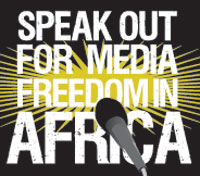Hope for African media after Tunisian revolution?

"The symptoms that fuelled such a revolution are found all over the continent. And all these years we have seen different regimes come and go but people are still miserable," an African journalist exiled in South Africa told Bizcommunity.com this week on condition of anonymity.
"And, when we try to raise these issues and hold governments accountable we are detained, tortured and sometimes killed. But I have a dream: Africa will one day be freed of these morons thanks to the Tunisians."
Merciless tyrannical regimes
Mineral-rich Africa is home to one billion people - almost 90% of which live in extreme poverty, misery and fear. Freedom of expression and press liberties are almost non-existent, as tyrannical regimes' crackdown on dissent and criticism is deadly and merciless.
Jane Duncan, chair and professor of media and information society at Rhodes University, told Bizcommunity.com: "Tunisia is an extremely interesting and important development for democracy in Africa, the Middle East and beyond, as it shows that dictators everywhere must not sleep easy, they can be overthrown.
"As such, it gives hope to many countries whose citizens and media have been suppressed by dictators. As the saying goes, revolutions seem impossible until they become inevitable.
Democratic revolution
"However, it must be understood that Tunisia's revolution is a democratic revolution, it is not yet a social revolution. This means media freedom will register important gains over this period.
"And the fact that former President Ben Ali dropped restrictions on the internet in the dying days of his rule showed that censorship of popular aspirations was having the opposite of the intended effect and was in fact fuelling anger.
"Therefore the internet curbs were counterproductive and unsustainable. But unless the factors that gave rise to popular anger - namely the conditions of poverty and unemployment - are addressed, then these gains will be difficult to defend in the long run."
Duncan, a former director of Johannesburg-based Freedom of Expression Institute, believes that there is a real possibility that the revolution may have a contagious effect in the region, leading to mass mobilisation against other dictators, and the restoration of democratic rule, including media freedom.
"Already there are signs that this is happening," she noted.
African rulers could be caught off-guard
Like Tunisia's Ben Ali, most African despots are allegedly supported by France, UK, the European Union and the US, which provide them with 'protection' and 'safety' in exchange for oil, other mineral resources and lucrative contracts. China has also now joined this club of imperialist hypocrites.
As the Tunisian uprising reaches boiling point, several voices of reason are warning African rulers that they could soon be caught off-guard and dejected if they do not put their houses in order.
In its yesterday's editorial, The Citizen newspaper wrote: "Although Tunisia may seem far off, events there in the last few days have profound implications not only for the Arab world but for Africa in general. South Africa should take careful note."
SA could soon fall from grace
Long regarded as a model of freedom of expression and press liberties in Africa, SA in on the verge of falling from grace, as it prepares to build a society of secrets and establish a media tribunal to 'prosecute' print journalists.
But, Duncan warned: "While it may be possible to censor traditional media, it is practically impossible to censor digital media. So, attempts to control the flow of information in the social media age are a fruitless waste of time."










